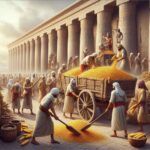 Joseph’s story in the Bible is a captivating tale of faith, wisdom, and timing. Here, let’s zero in on one pivotal moment: his interpretation of Pharaoh’s dream, which set the stage for Joseph’s remarkable rise to power in Egypt and how Joseph prepared for famine.
Joseph’s story in the Bible is a captivating tale of faith, wisdom, and timing. Here, let’s zero in on one pivotal moment: his interpretation of Pharaoh’s dream, which set the stage for Joseph’s remarkable rise to power in Egypt and how Joseph prepared for famine.
Pharaoh, the ruler of Egypt, was troubled by a series of unsettling dreams. In one, he saw seven fat cows being devoured by seven gaunt cows. In another dream, he envisioned seven healthy head of grain being swallowed by seven thin and scorched head of grain (Genesis 41:1-7). These vivid yet cryptic dreams left Pharaoh desperate for answers.
Enter Joseph, the young Hebrew who had already faced tremendous hardships – betrayed by his brothers, sold into slavery, and unjustly imprisoned. But what set Joseph apart was his unwavering faith in God. Recognizing Joseph’s gift, the cupbearer (who had previously met Joseph in prison) recommended him to Pharaoh.
Without hesitation, Joseph explained that the dreams were a divine warning from God. He interpreted them to mean that Egypt would experience seven years of great abundance followed by seven years of severe famine. This foresight was crucial – it wasn’t just a prediction, but a divine strategy that required immediate action (Genesis 41:25-36).
Pharaoh was astounded, not just by the accurate interpretation but by Joseph’s evident wisdom and connection to God. Realizing Joseph’s unique capabilities, Pharaoh elevated him to a position of high authority, second only to himself. Joseph’s new role would be to prepare Egypt for the impending crisis (Genesis 41:37-43).
Reflecting on this story, there’s a profound lesson in recognizing and trusting prophetic insights. Joseph’s interpretation wasn’t just about deciphering dreams – it was about understanding and acting on God’s divine plan. His rise from prisoner to Pharoh’s right-hand man shows how faith and wisdom can guide us through the most challenging times.
Strategic Foresight: Joseph Prepared for Famine
Joseph’s keen understanding of what lay ahead drove his strategic actions. The moment Pharaoh appointed him as overseer, Joseph rolled out an intricate plan to ensure Egypt’s survival during the impending famine. Joseph would initiate the creation of the largest natural disaster preparedness kit in history.
His first move was to implement a national food collection system. For seven consecutive years of abundance, Joseph directed the gathering and storing of surplus grain. The idea was to ensure that when the lean years hit, Egypt wouldn’t be caught off guard (Genesis 41:47-49). It’s a classic example of survival preparedness for a disaster scenario, not just for one’s family, but for a kingdom and more.
abundance, Joseph directed the gathering and storing of surplus grain. The idea was to ensure that when the lean years hit, Egypt wouldn’t be caught off guard (Genesis 41:47-49). It’s a classic example of survival preparedness for a disaster scenario, not just for one’s family, but for a kingdom and more.
Logistically, this was no small feat. Joseph had to create an extensive network of storehouses across the land. Each city had its own storage facility, making it easier to manage and distribute the collected grain when the time came. This decentralized approach was key in making sure food distribution would be seamless later on.
But it wasn’t just about storing grain. Joseph maintained a delicate balance between conserving for future scarcity and addressing the immediate needs of the people. His system allowed for efficient allocation without causing current shortages or panic. Essentially, he was future-proofing the nation.
Gaining the trust and cooperation of the Egyptian people was crucial. Joseph’s transparent and disciplined approach reassured them. He led by example, showing dedication and integrity, which motivated others to follow suit. His leadership wasn’t just about authority – it was about inspiring confidence and unity.
From Joseph, we can glean powerful lessons on foresight and survival preparedness. He teaches us the importance of planning ahead for emergency crises and managing resources wisely. By looking at Joseph’s strategic actions, we are reminded that foresight, paired with diligent preparation, can help us navigate even the most uncertain futures.
A Lifesaver in Time of Need: Joseph Distributes Food During the Famine

When the seven years of famine finally struck, Egypt found itself in a dire situation along with the surrounding nations. Harvests failed, and hunger spread rapidly. Yet, thanks to Joseph’s wise preparations, Egypt was not plunged into chaos.
Joseph created a well-organized distribution system to ensure that the food reached those who needed it most. People came from far and wide, seeking sustenance. His strategy not only kept Egypt stable but also turned it into a hub of aid for neighboring regions. The grain Joseph had stored became a lifeline.
Such an effort required robust management. Joseph orchestrated a system where food was distributed fairly and efficiently. His ability to manage resources earned him respect and reinforced the trust of the Egyptian people (Genesis 41:53-57).
Joseph’s fame spread, and his wisdom became evident to all. Even foreign visitors, who came to Egypt during the famine, were impressed by how efficiently everything was handled. One of the most significant moments was when his own brothers, who had previously sold him into slavery, traveled to Egypt seeking food. This reunion not only highlighted Joseph’s forgiveness but also showed the far-reaching impact of his actions in saving his family…and the ancestors of the future nation of Israel (Genesis 45:3-18).
The fact that Joseph prepared for famine teaches us that it is wise to set aside food, water, and other supplies ahead of potential disaster, whatever type that may be. His leadership demonstrates that true success lies in the ability to foresee challenges and turn them into opportunities to help others. Through his story, we learn that preparation, combined with compassion, can make all the difference in navigating hardships.
___________________________________________________________________________________________________
* I may earn a commission if you click on certain links on this website
Jaaxy – Find The Best Keywords For Your Website
